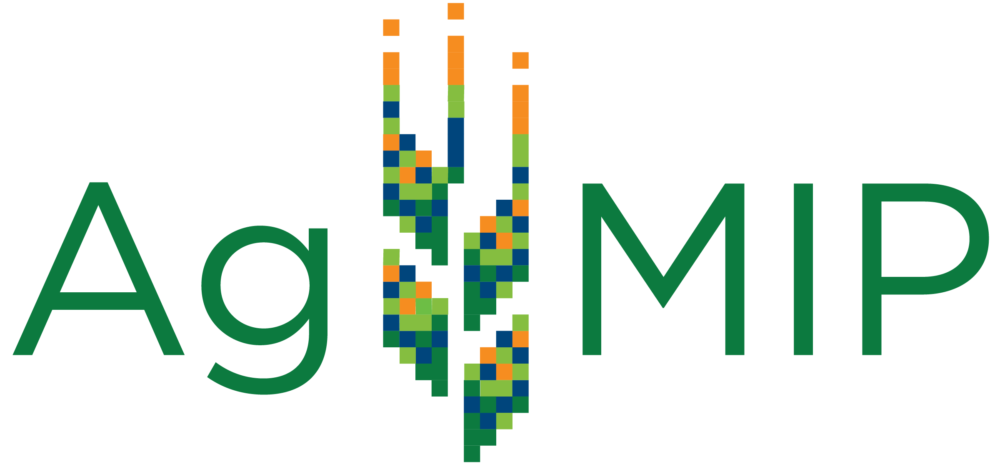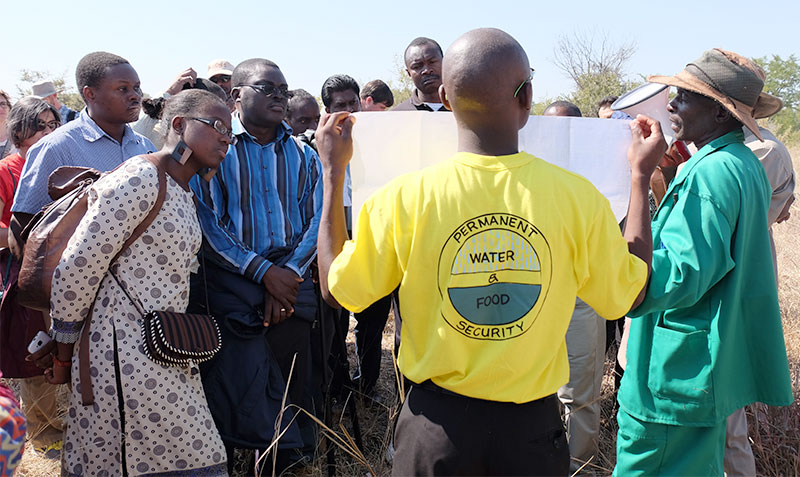By Shari Lifson
A cool bright June morning greeted the researchers arriving at the A’Zambezi Hotel in Victoria Falls, Zimbabwe late last month as they joined over 80 participants from 24 countries in attending the Agricultural Model Intercomparison and Improvement Project (AgMIP) Regional Fundamentals Workshop. Inside the large meeting hall filling up with participants, Cynthia Rosenzweig and John Antle (AgMIP Co-PIs) were ready to kick-off Phase 2 of the AgMIP regional research projects.
Since 2012 AgMIP Regional Research Teams from institutions in Sub-Saharan Africa and South Asia along with AgMIP leaders have been co-developing protocols for integrated assessments of the impacts of variable and changing climate on regional food security. The resulting Regional Integrated Assessment Protocols link climate, crop, livestock and economic models for mid-century projections of agricultural productivity, income and poverty rates. The assessment process includes interactions with regional Stakeholders who provide guidance on planning or policy actions and adaptations to test in future model runs. Findings are shared with stakeholders from Sub-Saharan Africa and South Asia, who help to further define and refine key messages based on the scientific results. (See Phase 1 Summary Report here.)
In the first phase of activity the Regional Research Teams completed integrated assessments for specific climate scenarios, crops, economic indicators, and localities and shared findings with stakeholders. Now in a second phase, the teams will strengthen the systems approach by expanding investigations to include current and future timeframes for multiple sites and/or combined crop/livestock systems, additional crops and adaptations. Along with these improvements, the processes of engagement with stakeholders will be advanced with more specific intent, learning documented and shared. To enable this effort a Stakeholder Unit has been included on the Leadership Team and designated Stakeholder Liaison members on each of the regional teams. The new team members will help facilitate information exchange among the stakeholders and researchers in their regions.
Also new for phase 2 is the rendering of a conceptual web-based tool proposed in Phase 1. Named the AgMIP ‘Impacts Explorer’ this functional prototype for scenario and information visualization will also support information exchange among stakeholders and researchers. The tool is being designed with user groups from key stakeholder areas to assist policy makers, planners and other interested parties in their exploration of data and results to inform decisions, and to help researchers better understand how to describe their findings for experts in other professions.
 Plenary session on the first day of the AgMIP Regional Fundamentals Workshop.
Plenary session on the first day of the AgMIP Regional Fundamentals Workshop.
The workshop in Victoria Falls brought together members of the regional teams with AgMIP Principal Investigators and discipline experts for technical training, stakeholder engagement planning, Impacts Explorer development, and refinements to individual team’s work scope. New team members learned about Regional Integrated Assessments and built skills in their disciplines. Returning team members expanded their skill base to include additional or complementary components – whether in economic, livestock, crop, or climate facets – and also learned about the stakeholder engagement team, the Impacts Explorer, and workflow management tools to help along the way.
The workshop began on Wednesday, June 24 with Rosenzweig and Antle welcoming the participants and thanking the local hosts Kizito Mazvimavi, Sabine Homann and Cordeliah Ndwalaza (all from the International Crops Research Institute for the Semi-Arid Tropics located in Bulawayo, Zimbabwe). Rosenzweig commented, “Phase 2 is very exciting, we are able to continue the very strong foundation of work from Phase 1 in creating the methodology for the Regional Integrated Assessments and the first manifestations of the new methodology.”
Mazvimavi also welcomed the group and noted that in Zimbabwe, “Agriculture is the backbone of the economy and provides a living for more than 70% of the population. More than a third of the land is semi-arid/arid – our farmers in these areas are at the forefront of dealing with the challenges of climate change.” He continued, “ICRISAT welcomes and supports AgMIP as an important initiative that places research at the priorities of national and local specific interests.”
Following the introductions, Rosenzweig presented the State of AgMIP and Antle presented an overview of Phase 2. In his presentation Antle prioritized the main goals of the new Phase 2 research projects. The first priority, he explained, is answering Stakeholders’ questions including the development of the Impacts Explorer and knowledge products such as briefs. The second priority is “finding the answers” by improving the core activity of Regional Integrated Assessments. This can be accomplished by extending regional coverage, using new development pathways and scenarios, and testing more adaptations co-developed with stakeholders. Finally Antle stressed the importance of improving the science to provide better answers through more robust projections of climate change impacts and benefits of adaptation and thus increase the reliability of results.
 John Antle explaining the 4 core questions for Phase 2 research.
John Antle explaining the 4 core questions for Phase 2 research.
In Phase 1, Antle continued, researchers worked to answer three core questions: What is the sensitivity of current agricultural production systems to climate change? What is the impact of climate change on future agricultural production systems? And what are the benefits of climate change adaptations? For the Phase 2 research an additional question will be included in response to Stakeholders’ requests: What is the effect of adaptations applied in the current climate? By adding this question the future benefit of adaptations can be compared to the benefit for present-day farming systems.
Each of the research teams from South-eastern Africa, Southern Africa, West Africa, East Africa, Pakistan, Indo-Gangetic Basin, and South India then presented their team’s plans for Phase 2 research. The detailed plans included proposed sites, crops, livestock, models, data and timelines to be included in the work over the next two years.
In the afternoon the workshop participants focused on stakeholder engagement and Phase 1 messaging. The teams broke out separately to discuss prioritizing audiences, distilling findings and designing appropriate messages and visualizations. The Impacts Explorer was also discussed by the teams as a tool for stakeholder use, introduced by Sander Janssen.
 Crop modelers during a technical training session.
Crop modelers during a technical training session.
The next two days of the workshop were devoted to technical training sessions led by discipline experts. Antle and Roberto Valdivia led TOA-MD training sessions for the economists, Cheryl Porter and John Dimes held crop-modeling and IT training, Katrien Descheemaeker and Ramilan Thiangajarah introduced livestock-modeling, and Alex Ruane and Sonali McDermid conducted climate-modeling sessions.
Concurrently Wendy-Lin Bartels, Amy Sullivan and the Stakeholder Liaisons met with the Janssen and other members of the Impacts Explorer group from Wageningen University in the Netherlands and with local stakeholders from Zimbabwe. In small groups the stakeholders and researchers discussed elements of the Impacts Explorer development and likely users. This interaction will help the development team target appropriate stakeholders and provide information visualizations that can be useful for decision-making.
 Stakeholder Unit leaders, liaisons, and local stakeholders.
Stakeholder Unit leaders, liaisons, and local stakeholders.
On day four of the workshop the participants met once again in the morning as a group to discuss protocols and how results from the different models would be brought into the Regional Integrated Assessments. Ruane, also AgMIP Science Coordinator, spoke about configuration of the climate protocols that will be followed by each of the teams.
In the afternoon each regional team met to create a stakeholder engagement strategy and define messaging. The preliminary strategies were then reported back to the group. The Stakeholder Liaisons will continue to develop these strategies with their teams and plan interactions with regional decision makers on an ongoing basis.
On Sunday, June 28, workshop attendees visited the Africa Center for Holistic Management, a nearby ranch that is implementing holistic livestock management strategies to reduce land degradation. The center gave a short introduction to the concepts of holistic livestock management and then demonstrated the field setup and herding. AgMIP workshop participants were able to ask questions and also provide scientific feedback to the center.
 AgMIP researchers learn about holistic livestock management.
AgMIP researchers learn about holistic livestock management.
On Monday and Tuesday, June 29th and 30th, the teams met separately again to finish up their planning, which they shared in individual sessions with the AgMIP Leaders, including Antle, Ruane, Sullivan, and Carolyn Mutter (International Coordinator). On Monday afternoon Alison Brizius from the Chicago Computation Institute demonstrated FACE-IT, a cloud-based model workflow tool that will be helpful in improving the teams’ computing capabilities and reducing the amount of time it will take for model runs to be completed.
The workshop wrapped up on Tuesday afternoon with team presentations outlining their work-plans including modifications made during the week, a timeline, and milestones. Each team left the workshop with clear research goals.
Several participants commented on the workshop experience expressing that they now clearly understood the AgMIP protocols and learned how to use the Face-IT tool. It was suggested to plan webinars in the coming months to share results, successes, questions, and discuss crop modeling, data and stakeholder communications.
The next workshop, to include new results from the second phase of Regional Integrated Assessments, is in planning for a Western Africa location in late February 2016.
A workshop attendee said about priorities in the next phase of work, “One of the most important things we need is feedback from our stakeholders. We have to track and find out if the policy makers are able to use our findings or our key messages to develop policy and how the policies have helped our farmers adopt some of the adaptation packages that we are developing.”


